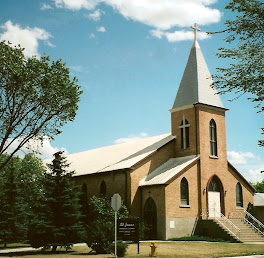Our topic for next Sunday is the Bible.
You should read the American Catechism's section on The Holy Scriptures.
The Catechism refers to the fact that we sometimes call the Scriptures or the Bible the Word of God. That can become very confusing for some, because we also use that phrase to describe the person of Jesus Christ. Read the opening part of John's Gospel (John 1: 1-14). It talks about Jesus as the Word of God, and closes with the very startling statement that "the Word became flesh and lived among us."
Some people talk as though our Christian religion is built around the Word of God (as in the Bible). That is a mistake. The centre of our Christian Faith is the Word of God (the person of Jesus Christ).
Watch this video from St. Michael's Church in Waynesboro, Georgia.
The Bible is a book - or rather a collection of books - that tell us the story of God's relationship with his creation. Like any good story, it starts at the beginning. The very first words in the very first book are "In the beginning . . ."
It starts by telling us about God creating the world. It tells us the stories of humanity's disobedience, about God's continuing relationship with us. We hear about his promises to Abraham, Isaac and Jacob. We learn about his covenant with the Hebrews, about their enslavement in Egypt and about the Exodus to the land God had promised. We hear the prophets calling the Hebrews to be faithful to their covenant with God.
The New Testament tells us the story of Jesus. We read about his life, his teachings, his death and his resurrection. We hear about the small community of believers who gathered afterwards, and the beginning of the story of how those few frightened disciples carried the story of Jesus throughout the known world.
It isn't always easy for us to understand what God is trying to tell us through the Bible. As Anglicans, we believe that we should interpret the Bible in the context of our wider community - the Church. We also believe in interpreting the Bible using the intelligence and reason that God gave us.
Some Anglicans refer to this as the three-legged stool: Scripture, Tradition and Reason.
Why a three-legged stool?
Have you ever tried to sit on a one-legged stool?
How about a two-legged stool?
A three-legged stool gives you stability and reliability in a way that a stool with fewer legs - or a stool with more legs - does not.
Father Matthew talks about Scripture, Tradition and Reason in this video (although I was having trouble getting it to work on Saturday).
In 1571, the Church of England prepared the Thirty-Nine Articles of Religion in an effort to describe what Anglicans believe. Article 6 is called The sufficiency of the Holy Scripture for Salvation. It begins by saying:
- Holy Scripture contains all things necessary to salvation: so that whatsoever is not read therein, nor may be proved thereby, is not to be required of any man, that it should be believed as an article of the faith, or be thought requisite or necessary to salvation.
So, for Anglicans, the Bible has three main sections: the Old Testament; the Apocrypha; and the New Testament. Some people will subdivide the Old and New Testament a little further.
Old Testament - The Pentateuch
- Genesis
- Exodus
- Leviticus
- Numbers
- Deuteronomy
- Joshua
- Judges
- Ruth
- 1st Samuel
- 2d Samuel
- 1st Kings
- 2d Kings
- 1st Chronicles
- 2d Chronicles
- Ezra
- Nehemiah
- Esther
- Job
- Psalms
- Proverbs
- Ecclesiastes
- Song of Solomon (Song of Songs)
- Isaiah
- Jeremiah
- Lamentations
- Ezekiel
- Daniel
- Hosea
- Joel
- Amos
- Obadiah
- Jonah
- Micah
- Nahum
- Habakkuk
- Zephaniah
- Haggai
- Zechariah
- Malachi
- 1st Esdras
- 2d Esdras
- Tobit
- Judith
- Rest of Esther
- Wisdom of Solomon
- Ecclesiasticus (Sirach)
- Baruch (with the Letter of Jeremiah)
- Song of the Three Children with the Prayer of Azariah
- Story of Susanna
- Bel and the Dragon
- Prayer of Manasseh
- 1st Maccabees
- 2d Maccabees
- 3d Maccabees
- Matthew
- Mark
- Luke
- John
- Acts of the Apostles
- Romans
- 1st Corinthians
- 2d Corinthians
- Galatians
- Ephesians
- Philippians
- Colossians
- 1st Thessalonians
- 2d Thessalonians
- 1st Timothy
- 2d Timothy
- Titus
- Philemon
- Hebrews
- James
- 1st Peter
- 2d Peter
- 1st John
- 2d John
- 3d John
- Jude
- Revelation (Apocalypse) of John
Malcolm+

